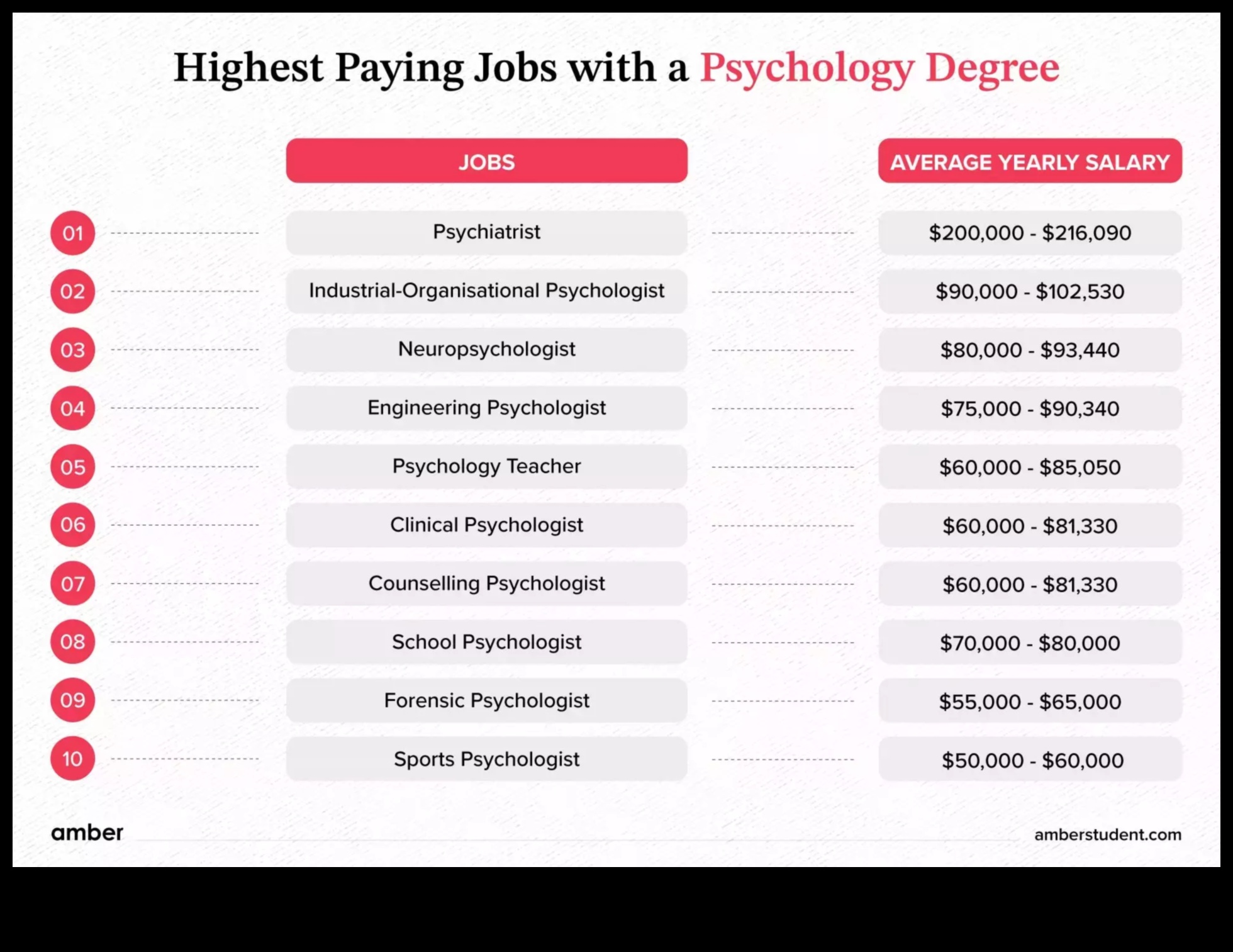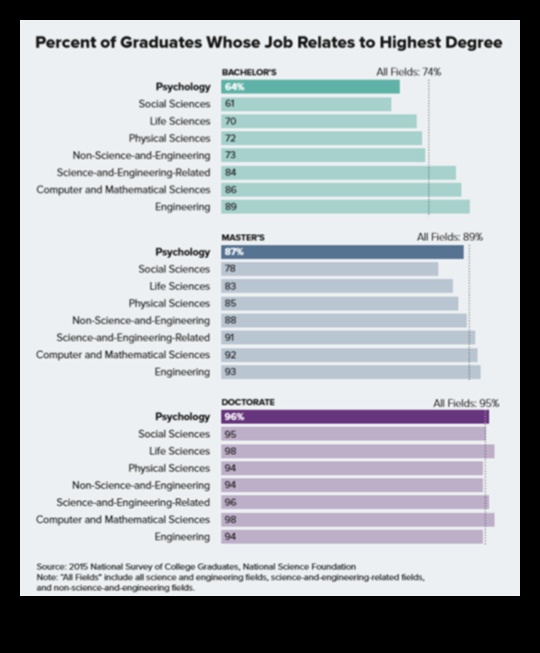
What Jobs Can I Do with a Bachelor’s in Psychology?
A psychology degree can open up a wide range of career opportunities. Here are 10 of the most popular jobs for psychology majors:
- Clinical psychologist
- School psychologist
- Industrial-organizational psychologist
- Forensic psychologist
- Counselor
- Social worker
- Marketing research analyst
- Human resources manager
- Teacher
To learn more about these jobs, visit our careers page.

How to Get a Job in Psychology
Getting a job in psychology can be competitive, but there are a few things you can do to improve your chances of success:
- Get good grades in your psychology classes.
- Gain experience through internships and volunteer work.
- Network with people in the field.
- Build your skills through continuing education courses.
- Create a strong resume and cover letter.
- Practice your interview skills.
For more information on how to get a job in psychology, visit our how to get a job in psychology page.
Salary and Job Outlook for Psychology Majors
The median annual salary for psychologists is $82,180. However, salaries vary depending on the type of job, the level of experience, and the geographic location.
The job outlook for psychology majors is expected to be good over the next few years. The Bureau of Labor Statistics projects that employment for psychologists will grow by 14% from 2020 to 2030, faster than the average for all occupations.
For more information on salary and job outlook for psychology majors, visit our salary and job outlook for psychology majors page.

The Pros and Cons of a Career in Psychology
A career in psychology can be rewarding and fulfilling. However, it is important to be aware of the pros and cons before you make a decision.
Pros of a career in psychology:
- Helping people
- Working with a variety of people
- Making a difference in the world
- Challenging and stimulating work
- Good job prospects
Cons of a career in psychology:
- High level of education required
- Competition for jobs
- Dealing with difficult and emotional situations
- Long hours
For more information on the pros and cons of a career in psychology, visit our pros and cons of a career in psychology page.

Popular Psychology Career Paths
There are many different career paths you can pursue with a psychology degree. Here are some of the most popular:
- Clinical psychology
- School psychology
- Industrial-organizational psychology
- Forensic psychology
- Coun
Topic Answer Psychology careers List of top 10 jobs for psychology majors Psychology jobs How to get a job in psychology Bachelor’s in psychology Salary and job outlook for psychology majors Careers for psychology majors The pros and cons of a career in psychology Psychologist Popular psychology career paths 
II. Top 10 Jobs for Psychology Majors
Here is a list of the top 10 jobs for psychology majors, along with their median annual salaries:
1. Clinical Psychologist: $79,010
2. Counseling Psychologist: $61,160
3. Industrial-Organizational Psychologist: $91,250
4. School Psychologist: $65,660
5. Social Psychologist: $63,220
6. Forensic Psychologist: $79,010
7. Marketing Psychologist: $81,120
8. Sports Psychologist: $70,510
9. Child Psychologist: $64,100
10. Rehabilitation Psychologist: $68,770These jobs are all in high demand, and they offer a variety of opportunities for psychology majors to use their skills and knowledge.
II. Top 10 Jobs for Psychology Majors
Here are the top 10 jobs for psychology majors, along with their median annual salaries:
- Clinical Psychologist: $79,000
- School Psychologist: $68,660
- Industrial-Organizational Psychologist: $85,260
- Counselor: $56,310
- Research Psychologist: $86,930
- Marketing Researcher: $65,850
- Social Worker: $52,430
- Human Resources Manager: $112,260
- Teacher: $60,660
- Speech-Language Pathologist: $77,510
II. Top 10 Jobs for Psychology Majors
Here are the top 10 jobs for psychology majors, along with their median annual salaries:
- Clinical Psychologist: $79,010
- Industrial-Organizational Psychologist: $86,230
- School Psychologist: $72,580
- Marketing Research Analyst: $63,530
- Social Worker: $59,120
- Human Resources Manager: $109,180
- Mental Health Counselor: $55,060
- Rehabilitation Counselor: $55,660
- Child Psychologist: $78,010
- Psychologist: $82,180
These jobs are all in high demand, and they offer good salaries and benefits. If you’re interested in a career in psychology, these are some of the best options to consider.
V. The Pros and Cons of a Career in Psychology
A career in psychology can be both rewarding and challenging. Here are some of the pros and cons of pursuing a career in this field:
- Pros:
- Helping people
- Working in a variety of settings
- Job security
- High salary potential
- Job satisfaction
- Cons:
- Challenging work
- Long hours
- Dealing with emotional distress
- Low job openings
- Competition for jobs
Ultimately, the decision of whether or not to pursue a career in psychology is a personal one. It is important to weigh the pros and cons carefully in order to make the best decision for yourself.
II. Top 10 Jobs for Psychology Majors
Here are the top 10 jobs for psychology majors, along with their median annual salaries:
- Clinical Psychologist: $79,010
- Industrial-Organizational Psychologist: $89,120
- School Psychologist: $72,530
- Counselor: $56,310
- Marketing Research Analyst: $63,120
- Human Resources Manager: $108,160
- Social Worker: $52,490
- Rehabilitation Counselor: $49,690
- Child Psychologist: $75,830
- Psychologist: $86,350
These jobs are all in high demand, and they offer a variety of opportunities for psychology majors to use their skills and knowledge.
VII. Tips for Choosing a Psychology Career
Here are some tips for choosing a psychology career:
-
Do your research.
-
Talk to people in the field.
-
Shadow a psychologist.
-
Get involved in psychology-related activities.
-
Pursue internships and volunteer opportunities.
-
Consider getting a master’s or doctoral degree in psychology.
By following these tips, you can increase your chances of finding a psychology career that you’re passionate about and that’s a good fit for your skills and interests.
How to Prepare for a Career in Psychology
There are a few things you can do to prepare for a career in psychology. These include:
- Get good grades in your psychology classes.
- Gain experience through internships and volunteer work.
- Network with psychology professionals.
- Pursue additional education and training, such as a master’s or doctoral degree in psychology.
In addition to these general tips, there are also some specific things you can do to prepare for specific psychology careers. For example, if you are interested in becoming a clinical psychologist, you will need to complete a doctoral degree in psychology and obtain a license to practice. If you are interested in becoming a research psychologist, you will need to complete a doctoral degree in psychology and focus on research in your dissertation.
No matter what your specific career goals are, it is important to start preparing early. By taking the necessary steps to prepare for a career in psychology, you can increase your chances of success.
IX. Resources for Psychology Majors
Here are some resources that can help you prepare for a career in psychology:
- American Psychological Association (APA) Careers Center
- Indeed: Psychology Jobs
- Monster: Psychology Jobs
- CareerBuilder: Psychology Jobs
- Psychology Today: Find a Job
FAQ
Q: What are the top 10 jobs for psychology majors?
A: The top 10 jobs for psychology majors are as follows:- Clinical psychologist
- School psychologist
- Industrial-organizational psychologist
- Forensic psychologist
- Social psychologist
- Counselor
- Research psychologist
- Marketing researcher
- Human resources manager
Q: How much do psychology majors make?
A: The median annual salary for psychology majors is $65,320. However, the salary range can vary significantly depending on the job title, industry, and level of experience.Q: What are the pros and cons of a career in psychology?
A: The pros of a career in psychology include:- Opportunities to help people
- Variety of career options
- High demand for psychology professionals
The cons of a career in psychology include:
- Competition for jobs
- Long hours
- Personal challenges

What Jobs Can I Do with a Bachelor’s in Psychology?
- Introduction
- Different Types of Psychology Careers
- How to Choose a Psychology Career
- Getting Started in a Psychology Career
- Paths to Higher Education in Psychology
- Salary and Job Outlook for Psychology Majors
- Benefits of a Psychology Degree
- Common Myths About Psychology Majors
- FAQs About Psychology Careers
- Conclusion
Feature Answer Psychology jobs There are many different types of psychology jobs available, including clinical psychologist, counseling psychologist, school psychologist, industrial-organizational psychologist, and forensic psychologist. Bachelor’s degree in psychology A bachelor’s degree in psychology is the minimum educational requirement for most psychology jobs. Career options with a psychology degree With a psychology degree, you can pursue a variety of careers in healthcare, education, business, and government. Psychology careers Psychology careers are rewarding and offer the opportunity to make a positive impact on people’s lives. Psychology salary The median annual salary for psychologists is \$75,430. 
II. Different Types of Psychology Careers
There are many different types of psychology careers available to those with a bachelor’s degree in psychology. Some of the most common career paths include:
- Clinical psychologist
- School psychologist
- Counselor
- Social worker
- Researcher
- Marketing manager
- Human resources specialist
- Sales representative
- Teacher
Each of these careers has its own unique set of requirements and responsibilities. For example, clinical psychologists typically work with individuals who are struggling with mental health issues, while school psychologists work with students who are struggling academically or socially. Counselors help people to cope with life challenges, while social workers help people who are in need of assistance. Researchers conduct research on psychological topics, while marketing managers use psychology to develop marketing strategies. Human resources specialists use psychology to help companies hire and retain employees, and sales representatives use psychology to sell products and services. Teachers use psychology to help students learn.
The salary potential for psychology careers varies depending on the specific job title and the level of experience. However, according to the Bureau of Labor Statistics, the median annual salary for psychologists is $75,820.
The educational requirements for psychology careers vary depending on the specific job title. However, most psychology careers require at least a bachelor’s degree in psychology. Some careers, such as clinical psychologist, require a master’s degree or doctorate in psychology.
In addition to educational requirements, psychology careers also require certain skills and qualities, such as:
- Communication skills
- Empathy
- Problem-solving skills
- Critical thinking skills
- Research skills
- Interpersonal skills
If you are interested in a psychology career, it is important to research the different career paths available to you and to make sure that you have the necessary skills and qualifications. You can also talk to your professors, advisors, and career counselors to get more information about psychology careers.
II. Different Types of Psychology Careers
There are many different types of psychology careers available to those with a bachelor’s degree in psychology. Some of the most common career paths include:
Clinical psychologist: Clinical psychologists work with individuals and families to help them address mental health issues such as depression, anxiety, and addiction. They typically work in private practice, hospitals, or clinics.
School psychologist: School psychologists work with students to help them learn and develop in a positive way. They typically work in schools, but they may also work in private practice or other settings.
Industrial-organizational psychologist: Industrial-organizational psychologists work with businesses to improve employee productivity and satisfaction. They typically work in human resources departments or consulting firms.
Forensic psychologist: Forensic psychologists work with the legal system to assess and treat criminal offenders and victims of crime. They typically work in prisons, courts, or law firms.
Research psychologist: Research psychologists conduct research on a variety of topics related to psychology. They typically work in universities, research institutes, or government agencies.These are just a few of the many different types of psychology careers available. With a bachelor’s degree in psychology, you can pursue a career in a variety of fields that can make a real difference in the world.

II. Different Types of Psychology Careers
There are many different types of psychology careers available to those with a bachelor’s degree in psychology. Some of the most common career paths include:
- Clinical psychologist
- School psychologist
- Industrial-organizational psychologist
- Forensic psychologist
- Social psychologist
- Health psychologist
- Sports psychologist
- Marketing psychologist
- Consumer psychologist
Each of these careers has its own unique set of requirements and opportunities. For example, clinical psychologists typically work with individuals who are struggling with mental health issues, while school psychologists work with students in schools to help them learn and succeed. Industrial-organizational psychologists work with businesses to improve employee productivity and morale, while forensic psychologists work with the legal system to assess criminal defendants and provide expert testimony.
The salary potential for psychology careers varies depending on the specific job title and the level of experience. However, according to the Bureau of Labor Statistics, the median annual salary for psychologists was $82,180 in 2020.
II. Different Types of Psychology Careers
There are many different types of psychology careers available to those with a bachelor’s degree in psychology. Some of the most common psychology careers include:
- Clinical psychologist
- Counselor
- School psychologist
- Social worker
- Research psychologist
- Industrial-organizational psychologist
- Marketing psychologist
- Forensic psychologist
- Sports psychologist
Each of these careers requires a different set of skills and qualifications, so it is important to do your research and choose a career that is a good fit for your interests and skills.

What Jobs Can I Do with a Bachelor’s in Psychology?
A bachelor’s degree in psychology can prepare you for a variety of careers in the mental health field, as well as in other fields such as business, education, and law. Some of the most common psychology careers include:
- Clinical psychologist
- Counselor
- School psychologist
- Social worker
- Psychologist researcher
- Human resources manager
- Market research analyst
- Teacher
- Lawyer
The salary potential for psychology majors varies depending on the specific career path you choose. However, according to the Bureau of Labor Statistics, the median annual salary for all psychology occupations is $72,820.
The educational requirements for psychology careers vary depending on the specific job you want. However, most psychology careers require at least a bachelor’s degree in psychology. Some careers, such as clinical psychology, also require a master’s or doctoral degree.
If you are interested in a career in psychology, it is important to have a strong understanding of the field and the different career options available. You should also be able to communicate effectively, be able to work independently, and be able to empathize with others.
VII. Benefits of a Psychology Degree
A psychology degree can provide you with a number of benefits, including:
- A strong foundation in the scientific study of behavior
- Critical thinking skills
- Problem-solving skills
- Communication skills
- Empathy
- Interpersonal skills
- Research skills
- Leadership skills
These skills can be valuable in a variety of careers, including:
- Mental health counseling
- Social work
- Education
- Business
- Marketing
- Human resources
- Research
- Teaching
With a psychology degree, you can also pursue a career in law, medicine, or government.
A psychology degree can be a great investment for your future. It can provide you with the skills and knowledge you need to succeed in a variety of careers.
Common Myths About Psychology Majors
There are a number of common myths about psychology majors that can deter people from pursuing this field of study. Here are some of the most common myths, and the truth behind them:
Myth #1: Psychology majors are all crazy.
This is one of the most damaging myths about psychology majors, and it is simply not true. In fact, psychology majors are no more likely to be crazy than any other group of people. In fact, many psychology majors go on to become mental health professionals, helping others to overcome their own mental health challenges.
Myth #2: Psychology majors can’t get a job.
This is another myth that is simply not true. In fact, psychology majors have a wide range of career options available to them, including jobs in mental health, business, education, and research.
Myth #3: Psychology majors are all interested in therapy.
This is also not true. While some psychology majors do go on to become therapists, many others pursue other careers in psychology, such as research, teaching, or consulting.
Myth #4: Psychology majors are all good at math.
This is not necessarily true. While some psychology majors do have strong math skills, others do not. In fact, many psychology majors find that they enjoy the more qualitative aspects of psychology, such as research and writing.
Myth #5: Psychology majors are all interested in human behavior.
This is also not true. While some psychology majors are interested in human behavior, others are more interested in the biological or cognitive aspects of psychology.
These are just a few of the common myths about psychology majors. If you are considering a psychology major, it is important to be aware of these myths so that you can make an informed decision about your future.
IX. FAQs About Psychology CareersHere are some frequently asked questions about psychology careers:
-
What are the different types of psychology careers?
-
How do I choose a psychology career?
-
How can I get started in a psychology career?
-
What are the paths to higher education in psychology?
-
What is the salary and job outlook for psychology majors?
-
What are the benefits of a psychology degree?
-
What are some common myths about psychology majors?
-
What are some FAQs about psychology careers?
FAQs About Psychology Careers
Q: What are some common psychology careers?
A: Some common psychology careers include clinical psychologist, counseling psychologist, school psychologist, industrial-organizational psychologist, and forensic psychologist.Q: What is the salary potential for psychology majors?
A: The median annual salary for psychology majors is $65,160. However, the salary potential can vary depending on the type of job and the level of experience.Q: What are the educational requirements for psychology careers?
A: Most psychology careers require a bachelor’s degree in psychology. However, some careers, such as clinical psychologist, require a master’s degree or doctorate.